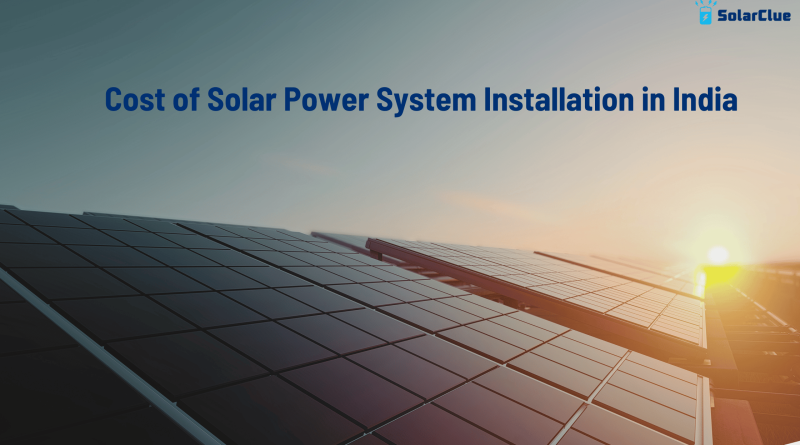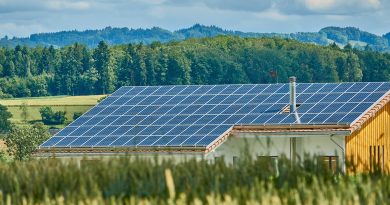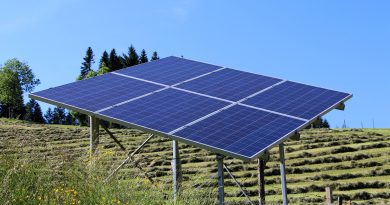What is the installation price of a Solar power system in India in 2024?
India is leading the world in the use of renewable energy, primarily through solar power. By 2030, the nation wants to attain its lofty target of 40% renewable energy. The cost of installing solar power systems becomes increasingly important to take into account as economies of scale and technological advancements take hold. This blog will examine the expected cost of installing solar power systems in India in 2023, providing insight into the variables that affect this expense and the possible advantages for end users.
Table of Contents
- 1 Average Cost of Solar Power System In India
- 2 Why is investing in solar power systems a good idea?
- 2.1 Why is the cost of solar power systems high?
Average Cost of Solar Power System In India
The capacity of the system, the calibre of the solar panels and other parts utilised, installation costs, and state-specific government incentives or subsidies can all have a significant impact on the average cost of a solar power system in India.
| Solar Power System | Price Range (Approximately) | |
| 1 kW Solar Power System | Rs. 85,000–90,000 | |
| 2 kW Solar Power System | Rs. 1,70,000–2,00,000 | |
| 3 kW Solar Power System | Rs. 2,00,000–2,20,000 | |
| 4 kW Solar Power System | Rs. 2,70,000–2,90,000 | |
| 5 kW Solar Power System | Rs. 3,20,000–3,60,000 | |
| 10 kW Solar Power System | Rs. 5,40,000–6,20,000 |
Why is investing in solar power systems a good idea?
Given how costly solar panels can initially be, you may be wondering if purchasing them is worthwhile. But here’s the thing: installing solar panels on your house or place of business is a great idea. To put it simply, here’s why:
1. Reduce cost:
Long-term energy bill savings are a major benefit of solar panels, despite their initial cost. Just think of the monthly electricity savings!
2. Beneficial to Earth:
Solar energy is environmentally friendly and clean. You can contribute to keeping the planet clean and livable for all by using solar power.
3. Government Assistance:
The use of solar power is encouraged by the government. To help you afford solar panels, they provide incentives and discounts.
4. Energy independence:
You won’t need to rely on the power company as much when you have solar panels. Even if there is a power outage in your area, power is still available to you.
5. Raise the Value of Your Home:
Installing solar panels can increase the appeal of your house to potential buyers. It’s similar to having a unique feature that adds character to your home.
6. Simple to Keep Up:
Solar panel maintenance is simple. Because you don’t have to do much to maintain them, you save money on upkeep.
7. Promote the Regional Economy:
Purchasing solar panels helps your community’s businesses grow and create jobs. It benefits your neighbourhood.
8. Technology Continues to Advance:
Solar technology continues to advance. Therefore, even if you install solar panels now, they will only get more efficient over time, increasing the value of your investment.
9. Inspiration from You:
People may be motivated to use solar energy if they witness you doing so. It’s a good example that can inspire others to take similar environmental actions.
Putting in solar panels is, in short, a wise and sustainable way to power your house. It’s a decision that can benefit everyone—it’s good for the environment and your pocketbook.
Why is the cost of solar power systems high?
Several factors affect how much solar power system installation costs. The higher cost isn’t indicative of premium pricing; rather, it’s a reflection of the significant long-term benefits. It’s important to realise that even though the initial cost may seem important, the major advantages make it the right choice.
1. Scale of the System
The cost of installing a solar energy system is largely determined by its size. Larger systems come with higher costs because they require more labour, supplies, and machinery. However, economies of scale may apply as systems get bigger, lowering the cost per unit for larger installations.
2. Solar Panel Technology
The kind and performance of solar panels used in a system have a direct impact on how much installation costs. Over time, developments in solar panel technology have reduced their cost and increased their efficiency. It is anticipated that future advancements will result in more affordable and effective solar panels by 2023, which could have an effect on the price of installing solar energy systems.
3. Policies and Incentives from the Government
Solar energy system installation costs are greatly impacted by government policies and incentives. The Indian government has set targets for renewable energy and offers a range of subsidies and tax breaks. With the potential to significantly lower installation costs for homeowners, these policy initiatives seek to encourage the use of solar energy.
4. Accessibility of Primary Resources
The price of installing solar energy systems is largely determined by the cost and availability of the raw materials needed. Glass, aluminium, and silicon are among the materials used extensively in solar panels. The total installation cost may increase or decrease depending on changes in the cost or availability of these raw materials.
5. Costs of Labour and Installation
A large amount of the installation cost is made up of the cost of labour and installation services. The cost of installation as a whole may vary depending on the availability and experience of skilled labour. It is anticipated that in 2023, labour costs will decline due to improvements in installation methods and heightened market competition, making installations more accessible to customers.
Estimated Solar Energy System Installation Cost in India by 2023
The installation cost of solar energy systems in India is predicted to trend downward in 2023 based on the previously mentioned factors and industry projections.
1. The government’s emphasis on renewable energy targets has led to a steady increase in the size of solar energy systems in India. Economies of scale are anticipated to take effect as scale rises, lowering installation costs per unit.
2. Furthermore, it is projected that developments in solar panel technology will raise the efficiency and lower the cost of solar energy systems. Installing solar panels will probably cost less thanks to technological advancements like lower manufacturing costs and increased efficiency.
3. The government’s solar energy-friendly policies and incentives will remain crucial in driving down installation costs. The goal of subsidies, tax breaks, and advantageous laws is to increase consumer access to and affordability of solar energy.
4. By 2023, it’s anticipated that both the cost and availability of the raw materials needed for solar energy systems will have stabilised. The need for raw materials will rise as the solar industry expands, resulting in more stable pricing. Furthermore, improvements in recycling and sustainable material sourcing may be able to offset price swings.
5. In 2023, labour and installation costs should go down as a result of more competition and better installation methods. Installation costs are anticipated to rise as more companies enter the market and qualified labour becomes more widely available.
Considering all of these variables, it is anticipated that solar energy system installation costs in India in 2023 will be lower than in prior years. Customers now have a great chance to adopt solar energy as a dependable and environmentally friendly replacement for conventional energy sources.
Conclusion
Stay informed with SolarClue® as your trusted partner for solar journeys. We consider factors like system size, location, and energy needs to determine the installation price in India in 2024. Break down costs transparently, optimizing your solar investment. Gain insights into system size selection, financing options, and government incentives to maximize ROI. Stay updated on market trends and price fluctuations. Explore financing options and government support. Receive guidance on potential challenges and hidden costs, and stay informed about the latest technological advancements. Join our community to share experiences and contribute to ongoing learning. Trust SolarClue® for a transparent and informed solar journey in 2024.
Frequently Asked Questions
SolarClue® considers factors such as system size, location, and energy needs to determine the installation price of a solar power system in India in 2024. We assist users in understanding these variables for accurate project cost estimation.
SolarClue® breaks down components contributing to the installation price, including solar panels, inverters, mounting structures, wiring, labor, and additional expenses. We offer transparency for users to understand their solar investment.
SolarClue® guides users in optimizing cost-effectiveness for solar power system installations. We provide insights into selecting the right system size, financing options, and government incentives available in 2024, maximizing the return on investment.
SolarClue® provides users with information on current market trends and price fluctuations of solar components. We ensure users stay updated on the latest developments impacting the installation price of solar power systems in 2024.
SolarClue® offers insights into government incentives and subsidies for solar power system installations in India in 2024. We detail eligibility criteria, application processes, and recent updates, helping users maximize financial support for their projects.
SolarClue® addresses concerns about potential hidden costs or challenges during solar power system installations. We offer guidance on preventive measures and tips, ensuring users are well-prepared for the entire process in 2024.
SolarClue® educates users on financing options for solar power system installations in 2024. We cover upfront payments, loans, and leasing models, enabling users to choose the most suitable financial arrangement based on preferences and budget constraints.
SolarClue® stays informed about the latest technological advancements in solar power systems. We incorporate information on innovative features and improvements that may impact the installation price or efficiency of systems in 2024.
SolarClue® assists users in estimating the return on investment (ROI) for their solar power system installations in 2024. We consider factors like electricity savings, maintenance costs, and overall financial benefits.
SolarClue® fosters a community where users share experiences with solar power system installations in 2024. We facilitate knowledge exchange, creating a collaborative platform for ongoing learning and insights.




